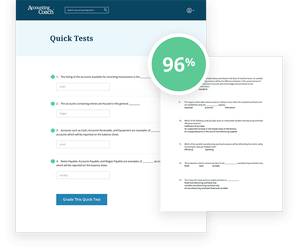For multiple-choice and true/false questions, simply press or click on what you think is the correct answer. For fill-in-the-blank questions, press or click on the blank space provided.
If you have difficulty answering the following questions, read our In-Depth Explanation for this topic.
Debit
Credit
Debit
Credit
Debit
Credit
Asset
Liability
Equity
Revenue
Expense
Debit
Credit
Asset
Liability
Equity
Revenue
Debit
Credit
Asset
Liability
Equity
Revenue
Expense
Debit
Credit
Contra Asset
Equity
Expense
Liability
Revenue
Debit
Credit
Incurring The Interest Expense
Paying The Interest To The Lender
Earning The Interest Revenues
Receiving The Interest From The Borrower
Incurring The Insurance Expense
Paying The Insurance Company
Earning The Revenues
Receiving The Money From The Customer
A Debit To Cash
A Credit To Interest Payable
A Debit To Interest Payable
A Debit To Prepaid Interest
A Debit To Cash
A Debit To Interest Income
A Credit To Interest Receivable
A Debit To Interest Receivable
A Credit To Cash
A Credit To Insurance Expense
A Debit To Insurance Expense
A Debit To Insurance Payable
A Debit To Cash
A Credit To Fees Earned
A Debit To Fees Earned
A Credit To Fees Receivable
The Accrued Amount Of Insurance Expense
The Original Amount Of The Insurance Premiums Paid
The Expired Portion Of The Insurance Premiums Paid
The Unexpired Portion Of The Insurance Premiums Paid
The Accrued Amount Of Fees That Have Been Earned
The Original Amount Of Fees Received In Advance From A Customer
The Fees Received In Advance Which Are Not Yet Earned
The Amount Of Fees Received In Advance And Which Are Now Earned
Accrual
Deferral
Depreciation
One Balance Sheet Account And One Income Statement Account
Two Balance Sheet Accounts
Two Income Statement Accounts
Use the following information to answer questions 24 – 29:
A company borrowed $100,000 on December 1 by signing a six-month note that specifies interest at an annual percentage rate (APR) of 12%. No interest or principal payment is due until the note matures on May 31. The company prepares financial statements at the end of each calendar month. The following questions pertain to the adjusting entry that should be entered in the company’s records.
Answer
Answer
Answer
Answer
Answer
Answer
Use the following information to answer questions 30 – 35:
A bank lent $100,000 to a customer on December 1 that required the customer to
pay an annual percentage rate (APR) of 12% on the amount of the loan. The loan is due
in six months and no payment of interest or principal is to be made until the note is due
on May 31. The bank prepares monthly financial statements at the end of each calendar
month. The following questions pertain to the adjusting entry that the bank will be making for its accounting records.
Answer
Answer
Answer
Answer
Answer
Answer
Use the following information to answer questions 36 – 41:
On December 1, your company paid its insurance agent $2,400 for the annual insurance premium covering the twelve-month period beginning on December 1. The $2,400 payment was recorded on December 1 with a debit to the current asset Prepaid Insurance and a credit to the current asset Cash. Your company prepares monthly financial statements at the end of each calendar month. The following questions pertain to the adjusting entry that should be written by the company.
Answer
Answer
Answer
Answer
Answer
Answer
Use the following information to answer questions 42 – 47:
On December 1, your company paid its insurance agent $2,400 for the annual insurance premium covering the twelve-month period beginning on December 1. The $2,400 payment was recorded on December 1 with a debit to the income statement account Insurance Expense and a credit to the current asset Cash. Your company prepares monthly financial statements at the end of each calendar month. The following questions pertain to the adjusting entry that should be written by the company.
Answer
Answer
Answer
Answer
Answer
Answer
Use the following information to answer questions 48 – 53:
On December 1, XYZ Insurance Co. received $2,400 from your company for the annual insurance premium covering the twelve-month period beginning on December 1. XYZ Insurance Co. recorded the $2,400 receipt as of December 1 with a debit to the current asset Cash and a credit to the current liability Unearned Revenues. XYZ Insurance Co. prepares monthly financial statements at the end of each calendar month. The following questions pertain to the adjusting entry that should be written by the XYZ Insurance Co.
Answer
Answer
Answer
Answer
Answer
Answer
Use the following information to answer questions 54 – 59:
On December 1, your company began operations. On December 3 it purchased $1,500 of supplies on credit and recorded the transaction with a debit to the current asset Supplies and a credit to the current liability Accounts Payable. Your company prepares monthly financial statements at the end of each calendar month. At the end of the day on December 31, your company estimated that $700 of the supplies were still on hand in the supply room. The following questions pertain to the adjusting entry that should be entered by your company.
Answer
Answer
Answer
Answer
Answer
Answer
Use the following information to answer questions 60 – 65:
On December 1, your company began operations. On December 4 it purchased $1,500 of supplies on credit and recorded the transaction with a debit to the income statement account Supplies Expense and a credit to the current liability Accounts Payable. Your company prepares monthly financial statements at the end of each calendar month. At the end of the day on December 31, your company estimated that $700 of the supplies were still on hand in the supply room. The following questions pertain to the adjusting entry that should be entered by your company.
Answer
Answer
Answer
Answer
Answer
Answer

Get Our Premium Adjusting Entries Test Questions When You Join PRO
Receive instant access to our entire collection of premium materials, including our 1,800+ test questions.
View All PRO FeaturesFeatures
Free
PRO
Read 3,034 Testimonials